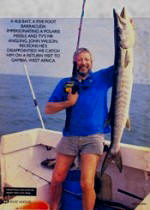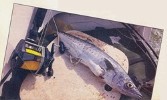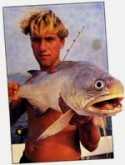| |
FEATURED ARTICLE
written by John
Wilson
t.v angling presenter of the 'Go
fishing' series
'Missile Minded
Barracuda'

Coloured water hid the entanglement
of rocks 60ft below and with the
tide now ebbing strongly, we
expected something lean and hungry
to sniff out and come crashing into
our baits. We weren't to be
disappointed!
Out of the blue, something unseen
made off with a 4lb Spanish Mackerel
concealing a double 10/0 hook rig.
The reel started to squeal like a
stuck pig with that uncanny
suddenness only associated with
shark fishing and when I slammed
home the clutch to strike I was
certainly not expecting a
missile-minded barracuda. This
projectile veered across the tide
going like a bat out of hell and
performed multiple Polaris
impersonations despite the heavy
shark trace and 50lb outfit which
should have slowed it down, but
appeared to have little effect.
Moreover the 'cuda' had completely
swallowed the Spanish Mackerel.
But then it was close to five feet
long and better than 30lb. Not
a huge specimen by any means but
nice and typical of the quality in
surprises you can expect when
probing the deep coloured and
incredibly fertile waters of the
Gambia River. Yes, I was back
in Africa again, guest of and old
pal Mark Longster who I had not
 seen
for nearly four years and whose
unexpected fax simply said: 'John,
the bottom fishing right now is
fantastic. Do you fancy a
week's action?' Well, who would need
asking more than once, I certainly
didn't and was straight on the phone
to Thomson Holidays to arrange an
in-expensive package B&B flight for
the middle of November.
Regular viewers of my TV series Go
Fishing may recall that Mark and I
teamed up when a big lemon shark
came along and bang on cue for the
cameras, provided some of the most
exciting footage we've ever shown on
television. The programme also
included the usual assortment of
weird and colourful critters you
would expect to catch from the
mangrove creeks. seen
for nearly four years and whose
unexpected fax simply said: 'John,
the bottom fishing right now is
fantastic. Do you fancy a
week's action?' Well, who would need
asking more than once, I certainly
didn't and was straight on the phone
to Thomson Holidays to arrange an
in-expensive package B&B flight for
the middle of November.
Regular viewers of my TV series Go
Fishing may recall that Mark and I
teamed up when a big lemon shark
came along and bang on cue for the
cameras, provided some of the most
exciting footage we've ever shown on
television. The programme also
included the usual assortment of
weird and colourful critters you
would expect to catch from the
mangrove creeks.
But on a personal level, and due to
the lack of time plus the pressure
of putting these sequences together,
I felt I had rather missed out on
the unbelievable choice of inshore
boat fishing over the reefs and sand
bars that the Gambia River has to
offer... hence my keenness to
return.
There are, in fact, over 30, yes 30,
different species within that meaty,
arm wrenching 30lb-50lb weight
bracket that you could possibly bump
into, and half of these actually top
three figures.
Additional to seven species of
sharks there are several types of
ray and guitarfish. Several
species of the 'Jack' family,
African pompano, leer fish, cobia,
several different types of snappers, kujeli
(Threadfin salmon), cassava, mackerel, tuna,
tarpon... have I whetted
your appetite?
Mark has specialised more and more
on the range of inshore reef fishing
options since my last visit,
obtaining yet another boat enabling
him to pass easily beneath the
famous 'Denton Bridge' by the now
defunct peanut factory straight out
into the Atlantic, and literally
within a few minutes motoring
distance of numerous productive
reefs and sand bars.
Those who have already fished there
will know full well that large craft
can only get out through the river
mouth and into the Atlantic by
navigating a complex network of
mangrove creeks which eventually
lead to behind the harbour and
around the coastline.
All of which eats away at precious
fishing time. So Marks'
investment has more than paid off
resulting in continuous bookings.
There is, of course, nothing to stop
you hiring a rowing dingy to fish
pieces of shrimp in the mangrove
creeks, or even as some do, though
it is exceedingly muddy, walk
along the mangroves and banks to
fish.
Standard carp - pike gear with a
10lb-15lb line will handle most
likely customers, though you may
have to go for the occasional long
row or walk with a stingray!
You can stay anchored out in deep
water right in the mouth of the
river which is some four miles wide,
or motor inland where it is twice
the width and fish the strong tide
flow close to Dog Island and stick
it out with big baits on the bottom.
You can troll Rapala Magnums around
the inshore reefs and even
eventually find blue water and
consequently add still more species
to the list of those expected.
Though for this you need a large,
fast boat and to motor at least
20-30 miles to evade the colour
spewed into Atlantic by the
Gambia River, which is over 300miles
in length and with a tidal
influence of over half that
distance.
My plan was to simply enjoy sport
with various battlers around the
inshore reefs and sand bars. A
trip to the local market close by
the Sunbeach Hotel quickly gave an
excellent indication of what the
local pirogue fishermen who anchor
over the inshore reefs were taking
on their hand lines. Big
jacks, kujeli, snappers and even
cobia were all for sale.
I was surprised about seeing cobia,
called black salmon locally, because
I assumed they were really a blue
water game species but specimens
approaching 100lb were there for the
taking. Unfortunately a biggie
never came my way although I did
hook into one which
characteristically rose up from the
bottom, as opposed to most species
which attempt to hang around your
line around the nearest rock, but
slipped the hook after all too short
a fight.
Continue...........
|
|
|
 |
Article
'Missile Minded
Barracuda'
|
|

Fishing
in The
Gambia -
What's
Available
General
Descriptions
| |
 |
|
TARPON FISHING
Fish for giant Atlantic Tarpon in The Gambia river estuary........Read More
|
|
| |
 |
|
REEF FISHING
Sport Fishing on the inshore reefs & sandbars...............................................Read More
|
|
| |
 |
|
CREEK FISHING
Light tackle species fishing in the oyster mangrove creeks...............Read More
|
|
| |
 |
|
SHORE ANGLING
Shore Angling Safariís along Gambiaís unspoilt coastline...............Read More
|
|
| |
|
|
|
|
| |
|
|
|
|
| |
|
|
|
|
| |
 |
|
THE BOAT - Skippers - Location
Our Boston Whaler boat will get you to all major fishing grounds within 30 mins.....................................Read More |
|
| |
|
|
|
|
| |
|
|
|
|
| |
|
|
|
|
| |
 |
|
RECENT CATCHES -
New
Take a look at what our Angler's have
been reeling in ..................Take a Look |
|
| |
|
|
|
|
| |
|
|
|
|
| |
|
|
|
|
 Visit
our Facebook Page Visit
our Facebook Page |
| |
|
|
|
|
| |
|
|
|
|
| |
|
|
|
|
|
| |
Continued..................
Those dogged, hard fighting red
snappers however didn't get away.
Known locally as cuberra, the most
common of the big snappers were
successfully lured on whole belly
fillets from a bonga. And it's
interesting to note that these
locally netted plankton eaters, the
most common fish seen in the
markets, is to all intents and
purposes related to our alias shad.
Now a 30lb outfit to catch a 30lb
snapper may perhaps seem slightly
over the top but these unbelievably
strong warm water reef dwellers
quickly shred lighter lines through
the rocks of anyone feeling more
sporting. It's hit and hold
arm wrenching stuff at the very
best.
Holding the rod with the reel out of
gear and the clutch preset quite
firmly usually sees many more
slamming takes converted into
snappers in the ice box, due to the
uncanny wariness of this fully
scaled, one might even say carp-like
fish. But there the
resemblance certainly ends because
the cubera's teeth are strong
dog-like canines, and its fighting
capabilities like all saltwater
tropicals put carp to shame.
Talking of fighting, one fish I
hoped to get amongst during my Gambia break was the mighty
tarpon. Mark had taken them in
the river mouth to 190lb a few weeks
previously but the surface was far
too ruffled during my stay for
visually locating their
characteristic rolling on the
surface in large groups. What
we did latch on to however was the
tarpon's younger cousin, the
ladyfish, and what a splendid
acrobatic fish it is. Locally
these silver streaks looking for all
the world like a stretched out
herring are locally called nine-bones and we boated them up to
10lbs on lures.
A rapala 'slither' in lime green
really did the business when trolled
through shallow water no more than
six feet deep between huge banks of
sand which has built up around the
outside entrance to Denton Bridge.
Anchoring in these long rolling
waves also accounted for them.
 We simply made long casts to the
side presenting small mullet or
herring live-baits on size 2/0 hooks
tied direct to 12lb line, with an
ounce bomb attached via a link fixed
two feet up the line using four-turn
water knot, and used the waves to
gently bump the bait across the
tide. We simply made long casts to the
side presenting small mullet or
herring live-baits on size 2/0 hooks
tied direct to 12lb line, with an
ounce bomb attached via a link fixed
two feet up the line using four-turn
water knot, and used the waves to
gently bump the bait across the
tide.
An exciting technique which also
took those rather prehistoric
looking flat fish called bastard
halibut, which also took rapalas,
and some jumbo king sized kujeli.
These fish with a built-in
jelly-like transparent nose are
actually threadfin salmon and while
those we took went to 20lb Mark had
seen them topping over 150lbs.
What a place! I cant wait to
get back to The Gambia.
Featured Article
'Missile Minded Barracuda'
Taken from 'Boat Angler' - March/April Issue
Written by John Wilson
Read More Featured Articles
by John Wilson
Fishing in The
Gambia
Gambia 'Top of
Big Name Game'
|
|
|